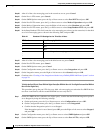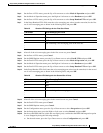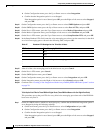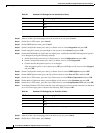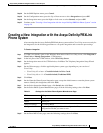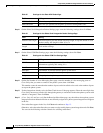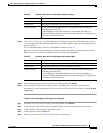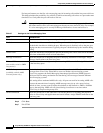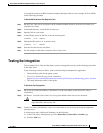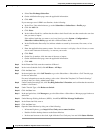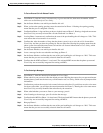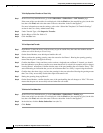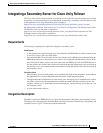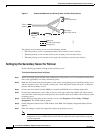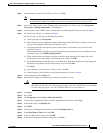
32
Avaya Definity Gx/PBXLink Integration Guide for Cisco Unity 4.0
OL-3105-15
Avaya Definity Gx/PBXLink Integration Guide for Cisco Unity 4.0
Creating a New Integration with the Avaya Definity/PBXLink Phone System
For best performance, use the first voice messaging ports for incoming calls and the last ports to dial out.
This helps minimize the possibility of a collision, in which an incoming call arrives on a port at the same
time that Cisco Unity takes the port off-hook to dial out.
Caution In programming the phone system, do not send calls to voice messaging ports in Cisco Unity
that cannot answer calls (voice messaging ports that are not set to Answer Calls). For example,
if a voice messaging port is set only to Message Notification, do not send calls to it.
Step 6 Click Save.
Step 7 Exit UTIM.
Table 37 Settings for the Voice Messaging Ports
Field Considerations
Extension Enter the extension for the port as assigned on the phone system.
Enabled Check this check box to enable the port. The port is enabled during normal operation.
Uncheck this check box to disable the port. When the port is disabled, calls to the port get a
ringing tone but are not answered. Typically, the port is disabled only by the installer during
testing.
Answer Calls Check this check box to designate the port for answering calls. These calls can be incoming
calls from unidentified callers or from subscribers.
Message Notification Check this check box to designate the port for notifying subscribers of messages. Assign
Message Notification to the least busy ports.
Dialout MWI
(not used by serial or SMDI
integrations)
Check this check box to designate the port for turning MWIs on and off. Assign Dialout MWI
to the least busy ports.
AMIS Delivery
(available with the AMIS
licensed feature only)
Check this check box to designate the port for making outbound AMIS calls to deliver voice
messages from Cisco Unity subscribers to users on another voice messaging system.
Cisco Unity supports the Audio Messaging Interchange Specification (AMIS) protocol,
which provides an analog mechanism for transferring voice messages between different
voice messaging systems.
This setting affects outbound AMIS calls only. All ports are used for incoming AMIS calls.
Because the transmission of outgoing AMIS messages may tie up voice ports for long
periods of time, you may want to adjust the schedule on the Network > AMIS > Schedule
page so that outgoing AMIS calls are placed during closed hours or at times when
Cisco Unity is not processing many calls.
TRAP Connection Check this check box so that subscribers can use the phone as a recording and playback
device in Cisco Unity web applications and e-mail clients. Assign TRAP Connection to the
least busy ports.



